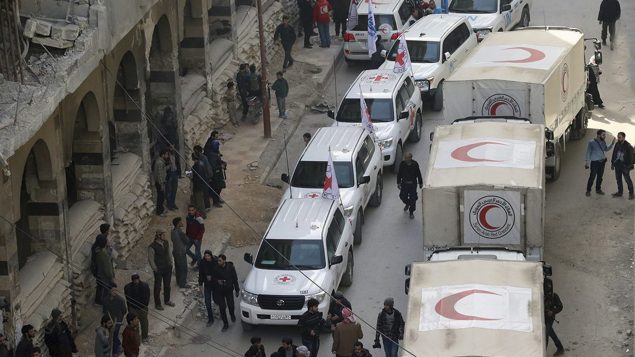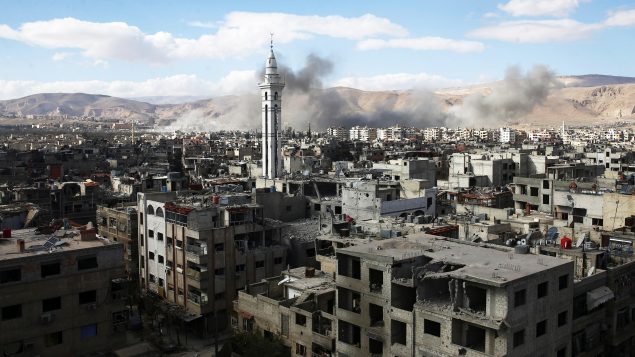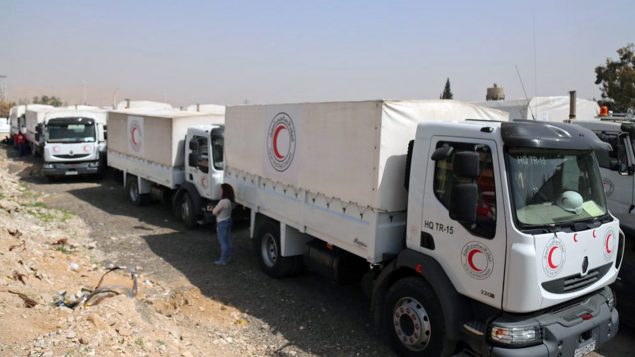A UN convoy delivered desperately needed food and medicine to besieged civilians in the war-ravaged eastern suburbs of Damascus on Monday, but aid agencies said Syrian authorities blocked the delivery of some of the health supplies, including trauma and surgical kits and insulin.
The shipment was the first to enter eastern Ghouta since Russia instituted what it called daily “humanitarian pauses” in the fighting a week ago. It also was the first time in weeks that any aid has been allowed in amid a crippling siege and a government assault that has killed hundreds of people in the past month.
Despite the UN Security Council-mandated truce, at least 50 civilians were killed Monday in airstrikes and shelling, according to the Britain-based Syrian Observatory for Human Rights monitoring group. The activist-run Ghouta Media Center said 24 people were killed in Hammouriyeh and another 10 in Harasta, both towns in eastern Ghouta.
The UN estimates there are still about 400,000 people in the rebel-controlled enclave.

This photo release by the Syrian Red Crescent, shows members of the Syrian Red Crescent distributing medicines for civilians in Douma, eastern Ghouta, a suburb of Damascus, Syria, Monday, March. 5, 2018. (Syrian Red Crescent via AP)
Marwa Awad, an Egyptian-Canadian who is the head of communications for the UN’s World Food Programme in Syria, said the 46-truck convoy of health and nutrition supplies, along with food for 27,500 people, entered Douma — the largest town in eastern Ghouta — around midday.
(Click to listen to the interview with Marwa Awad)
Listen“Our team is getting ready to leave now because the offloading of all the assistance has been completed and we managed to offload the contents of the 46 trucks safely,” Awad said in a phone interview from the al-Wafideen Camp, a government-controlled checkpoint about 100 metres north of Douma.
“And we’re just looking forward to be able to go back in there by the end of the week, as we have assurances that we can go in again with another convoy to try and reach up to 70,000 people.”

This photo released by the Syrian Red Crescent shows civilians gathering near a convoy of vehicles of the Syrian Red Crescent in Douma, eastern Ghouta, a suburb of Damascus, Syria, Monday, March. 5, 2018. (Syrian Red Crescent via AP)
But the Syrian government did not allow 70 percent of the health supplies to be loaded and would not allow them to be replaced by other items, UN officials said.
The World Health Organization said that during an obligatory routine inspection by Syrian national authorities, many of the supplies in the WHO shipment were rejected, including all trauma, surgical, dialysis and insulin supplies.
“Consequently, three of the 46 trucks being sent to Duma today are close to empty,” Awad told The Associated Press. “We hope to be able to take them inside on the next convoy Thursday.”
The government routinely removes lifesaving medical supplies from aid convoys, in a pattern of denying such aid to civilians living in opposition areas. U.N. officials have complained for years about such actions by the Syrian government.
Many civilians in Douma are desperate for food and medicine, and had hoped for relief as the convoy began entering the area, one of the last rebel strongholds near the capital.

Smoke rises from the besieged Eastern Ghouta in Damascus, Syria, February 27, 2018. (Bassam Khabieh/REUTERS)
Eastern Ghouta, which is controlled by an uneasy coalition of Islamist opposition forces, including the Hayat Tahrir al-Sham, a jihadist alliance led by al-Qaeda’s former affiliate in Syria, has been under a crippling siege and daily bombardment for months. More than 700 civilians have been killed in the last two weeks alone.
The U.N.’s Resident and Humanitarian Coordinator in Syria, Ali al-Za’tari, said the aid was delivered to civilian groups and local councils, in coordination with the Syrian Arab Red Crescent. Military groups did not receive any supplies, he said.
“We hope that civilians will get a fair share, their share, their ultimate share of the humanitarian supplies,” al-Za’tari told The Associated Press.
With file by The Associated Press







For reasons beyond our control, and for an undetermined period of time, our comment section is now closed. However, our social networks remain open to your contributions.